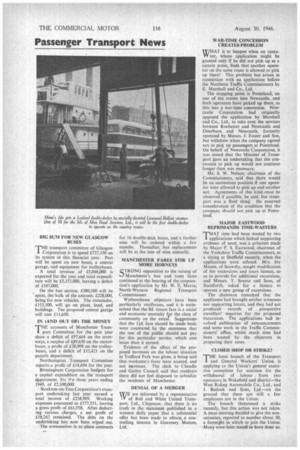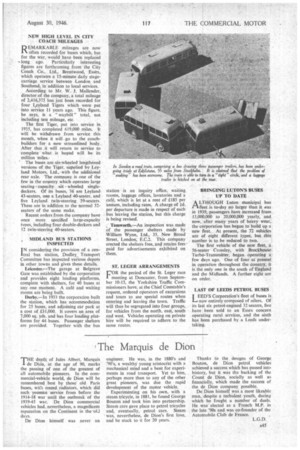WAR-TIME CONCESSION CREATES PROBLEM
Page 44

Page 47

If you've noticed an error in this article please click here to report it so we can fix it.
WHAT is to happen when an operaIT tor, whose application might be granted only if he did not pick up at a certain point, finds that another operator on the same route is allowed to pick up there? This problem has arisen in connection with an application before the Northern Traffic Commissioners by E. Marshall and Co., Ltd.
The stopping point is Ponteland, on one of the routes into Newcastle, and both operators have pickedup there, as this was a war-time concession. Newcastle Corporation had originally opposed the application by Marshall and Co., Ltd., to take over the services between Rochester and Newcastle and Otterburn and Newcastle, formerly operated by Messrs. J. Foster and Son, but withdrew when the company agreed not to pick up passengers at Ponteland. On behalf of Newcastle Corporation, it was stated that the Minister of Transport gave an undertaking that the concession to pick up would not continue longer than was necessary.
Mr, S. W. Nelson, chairman of the Commissioners, said that theie would be an anomalous position if one operator were allowed to pick up and another not. Agreements of this kind must be observed if possible, he said, but transport was a fluid thing. He reserved -consideration of the' condition that the company should not pick up at Ponteland.
MAJOR EASTWOOD REPRIMANDS TIME-WASTERS
THAT time had been wasted by two applications which lacked supporting evidence of need, was a criticism made by Major F. S. Eastwood, chairman of the Yorkshire Traffic Commissioners, at a sitting at Sheffield recently, when the applications were refused, Mrs. Ivy Mason, of Scawsby, sought modification of her excursions and tours licence, so as to provide for additional excursions, and Messrs. T. Severn and Sons, of Stainforth, asked for a licence to operate a new group of excursions.
The chairman remarked that the applicants had brought neither witnesses nor supporting letters, and they had not produced records of prospective travellers' inquiries for the proposed excursions. The applications had involved publication of announcements and some work in the Traffic Commissioners' office, whilst much time had been wasted by the objectors in preparing their cases.
CLOSED SHOP OR STRIKE?
THE local branch of the Transport 1 and General Workers' Union is applying to the Union's general executive committee for sanction for the withdrawal of labour from two operators, in Wakefield and district—the West Riding Automobile Co., Ltd., and J. Bullock and Sons, Ltd.—on the ground that there are still a few employees not in the Union.
Thc branch threatened a strike recently, but this action was not taken. A mass meeting decided to give the nonunionists, reported to number about 50, a fortnight in which to join the Union. Many were later stated to have done so.
NEW HIGH LEVEL IN CITY COACH MILEAGES
DEMARKABLE mileages are now 1‘ often recorded for buses which, but for the war, would have been replaced long ago. Particularly interesting figures are forthcoming from the City Coach Co., Ltd., Brentwood, Essbx, which operates a I5-minute daily stagecarriage service between London and Southend, in addition to local services.
According to Mr. W. J. Ma'lender, director of the company, a total mileage of 2,416,375 has just been recorded for four I,eyland Tigers which were put into service II years ago. This figure. he says, is a " waybill " total, not including test mileage, etc.
The first Tiger, put into service in 1935, has completed 619,000 miles. It will be withdrawn from service this month, when it will go to the coachbuilders for a new streamlined body. After that it will return to service to complete what is hoped will be its million miles..
The buses are six-wheeled lengthened versions of the Tiger. supplied by Leyland Motors. Ltd., with the additional rear axle. The company is one of the few in the country which operates large seating capacity six wheeled singledeckers. Of its buses, 36 are Leyland. 43-seaters, one a Leyland 40-seater, and five Leyland twin-steering 39-seaters. These are in addition to the normal 12seaters of the same make.
Recent orders from the company have once more specified large-capacity types. including four double-deckers and 12 twin-steering 40-seaters.
MIDLAND BUS STATIONS INSPECTED I N considering the provision of a central bus station, Dudley, Transport Committee has inspected various depots in other towns and gives these details_ Leicester.--The garage at Belgrave Gate was established by the corporation and provides eight loading platforms, complete with shelters, for 40 buses at any one moment. A café and waiting rooms are being built.
Derby.—In 1931 the corporation built the station, which has accommodation for 25 buss, and adjoining car park at a cost of 131,000. It covers an area of 7,000 sq. yds. and has four loading platforms for 44 buses. Passenger shelters are provided. Together with the bus station is an inquiry office, waiting rooms, luggage offices, lavatories and a café, which is let at a rent of £185 per annum, including rates. A charge of Id. per departure is made in respect of each bus leaving the station, but this charge is being revised.
, Tamworlh.—An inspection was made of the passenger shelters made by William Wynn, Ltd-, 35, New Broad Street, London, E-C-2. This company erected the shelters free, and retains feespaid for advertisements exhibited on them.
ST. LEGER ARRANGEMENTS
FOR the period of the St. Leger race meeting at Doncaster, from September 10-13, the Yorkshire Traffic Commissioners have, at the Chief Constable's request, ordered operators of excursions and tours to use special routes when entering and !caving the town. Traffic will thus be segregated into four groups, for vehicles from the north, east, south and west. Vehicles operating on private hire will be required to adhere to the same routes.
BRINGING LUTON'S BUSES UP TO DATE LTHOUGH Luton municipal bus CA fleet is to-day no larger than it was in 1939, passengers have increased from 13,000,000 to 20,000,000 yearly, and now, after many years of heavy wear, the corporation has begun to build up a new fleet. At present, the 72 vehicles are of eight different types, but this number is to be reduced to two.
The first vehicle of the new fleet, a 56-seater Crossley, with Brockhouse Turbo-Transmitter, began operating a few days ago. One of four at present in operation throughout the country, it is the only one in the south of England and the Midlands. A further eight are on order.
LAST OP LEEDS PETROL BUSES
L''S Corporation's fleet of buses is now entirely composed of oilers. Of its last six petrol-engined 32 seaters, five have been sold to an Essex concern operating rural services, and the sixth has been purchased by a Leeds undertaking.




































































